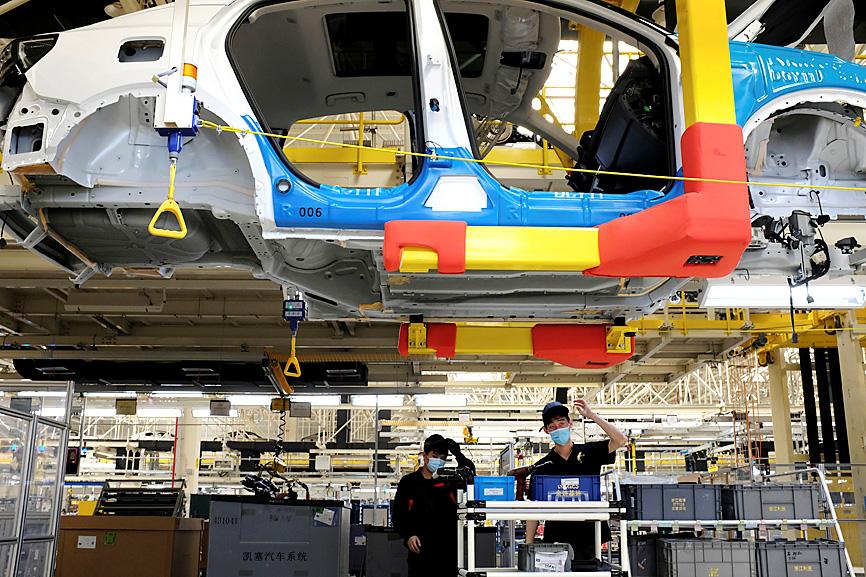Chinese automaker Zhejiang Geely Holding Group Co (吉利控股集團) plans to launch a new brand of electric vehicles (EVs), people familiar with the matter said, as the owner of Volvo seeks to become more competitive in a segment of the market dominated by Tesla Inc.
The company is applying for a slew of marques that would be housed under its Lingling Technologies unit, said the people, who asked not to be named discussing private matters.
The brands include Zeekr EVA, Zeekr Power and Zeekr OS, they said.

Photo: Reuters
The Zeekr brand will market EVs targeted at the premium segment of the market. The plans were reported earlier by Reuters.
A representative for Geely declined to comment.
Geely’s billionaire founder Li Shufu (李書福) is helming the company’s second attempt to electrify its product lineup after a previous effort, known as the Blue Geely Initiative, failed to meet its goal of having 90 percent of Geely sales consist of new-energy vehicles by last year.
Geely, which became the country’s biggest private automaker by winning customers in the lower-to-mid-market segment, is eyeing the premium electric-vehicle market to lure buyers from rivals such as Tesla and the NASDAQ-listed NIO Inc (蔚來汽車).
Over the past few months, Geely has been pushing further into EVs, forging major collaboration pacts with companies from search-engine heavyweight Baidu Inc (百度) to Apple Inc’s Taiwanese manufacturing partner Hon Hai Precision Industry Co (鴻海精密), known as Foxconn Technology Group (富士康科技集團) outside of Taiwan, and Tencent Holdings Ltd (騰訊).
On Monday, Geely Technology Group Co (吉利技術集團) signed an agreement with local authorities to invest 30 billion yuan (US$4.61 billion) to construct a battery factory in Ganzhou, Jiangxi Province, with an annual capacity of 42 gigawatt-hours.
The moves mark a shift in the approach of Li, who made his mark on the global auto industry over the past decade with a run of investments in traditional, European automakers such as Volvo and Mercedes-Benz maker Daimler AG.
In China, traditional automakers such as Geely and Volkswagen AG are jockeying with upstart EV makers such as NIO, Xpeng Motors (小鵬汽車) and Li Auto Inc (理想汽車) for a slice of what is the world’s largest EV market. Demand is forecast to soar in coming years as consumers embrace cleaner automobiles and the cost of EVs tumbles.
Research firm Canalys said in a report last month that EV sales in China might climb more than 50 percent this year alone.
Geely would also use Zeekr to venture into a more user-centered, lifestyle approach to the sector adopted by NIO, which has special clubhouses for drivers and built customer loyalty through events and merchandise such as clothing, food and electronic devices, the people said.

Intel Corp chief executive officer Lip-Bu Tan (陳立武) is expected to meet with Taiwanese suppliers next month in conjunction with the opening of the Computex Taipei trade show, supply chain sources said on Monday. The visit, the first for Tan to Taiwan since assuming his new post last month, would be aimed at enhancing Intel’s ties with suppliers in Taiwan as he attempts to help turn around the struggling US chipmaker, the sources said. Tan is to hold a banquet to celebrate Intel’s 40-year presence in Taiwan before Computex opens on May 20 and invite dozens of Taiwanese suppliers to exchange views

Application-specific integrated circuit designer Faraday Technology Corp (智原) yesterday said that although revenue this quarter would decline 30 percent from last quarter, it retained its full-year forecast of revenue growth of 100 percent. The company attributed the quarterly drop to a slowdown in customers’ production of chips using Faraday’s advanced packaging technology. The company is still confident about its revenue growth this year, given its strong “design-win” — or the projects it won to help customers design their chips, Faraday president Steve Wang (王國雍) told an online earnings conference. “The design-win this year is better than we expected. We believe we will win

Chizuko Kimura has become the first female sushi chef in the world to win a Michelin star, fulfilling a promise she made to her dying husband to continue his legacy. The 54-year-old Japanese chef regained the Michelin star her late husband, Shunei Kimura, won three years ago for their Sushi Shunei restaurant in Paris. For Shunei Kimura, the star was a dream come true. However, the joy was short-lived. He died from cancer just three months later in June 2022. He was 65. The following year, the restaurant in the heart of Montmartre lost its star rating. Chizuko Kimura insisted that the new star is still down

While China’s leaders use their economic and political might to fight US President Donald Trump’s trade war “to the end,” its army of social media soldiers are embarking on a more humorous campaign online. Trump’s tariff blitz has seen Washington and Beijing impose eye-watering duties on imports from the other, fanning a standoff between the economic superpowers that has sparked global recession fears and sent markets into a tailspin. Trump says his policy is a response to years of being “ripped off” by other countries and aims to bring manufacturing to the US, forcing companies to employ US workers. However, China’s online warriors